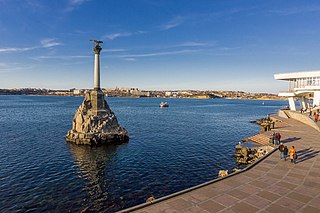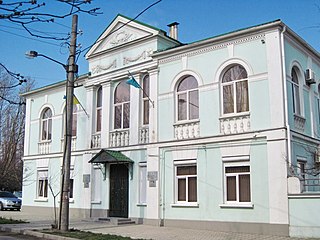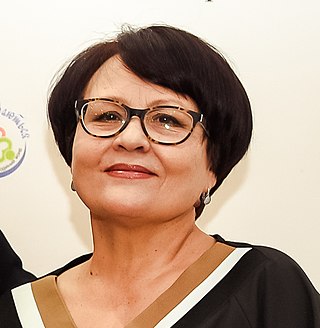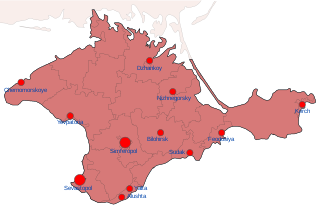
Sevastopol, sometimes written Sebastopol, is the largest city in Crimea and a major port on the Black Sea. Due to its strategic location and the navigability of the city's harbours, Sevastopol has been an important port and naval base throughout its history. Since the city's founding in 1783 it has been a major base for Russia's Black Sea Fleet, and it was previously a closed city during the Cold War. The total administrative area is 864 square kilometres (334 sq mi) and includes a significant amount of rural land. The urban population, largely concentrated around Sevastopol Bay, is 479,394, and the total population is 547,820.

Crimea is a peninsula in Eastern Europe, on the northern coast of the Black Sea, almost entirely surrounded by the Black Sea and the smaller Sea of Azov. The Isthmus of Perekop connects the peninsula to Kherson Oblast in mainland Ukraine. To the east, the Crimean Bridge, constructed in 2018, spans the Strait of Kerch, linking the peninsula with Krasnodar Krai in Russia. The Arabat Spit, located to the northeast, is a narrow strip of land that separates the Syvash lagoons from the Sea of Azov. Across the Black Sea to the west lies Romania and to the south is Turkey. The largest city is Sevastopol. The region has a population of 2.4 million, and has been under Russian occupation since 2014.

Crimean Tatars or Crimeans are a Turkic ethnic group and nation native to Crimea. The formation and ethnogenesis of Crimean Tatars occurred during the 13th–17th centuries, uniting Cumans, who appeared in Crimea in the 10th century, with other peoples who had inhabited Crimea since ancient times and gradually underwent Tatarization, including Greeks, Italians, Armenians, Goths, Sarmatians, English and others.
Television has a long history in Ukraine, where regular television broadcasting started during the Soviet years in 1951. However the first ever TV broadcast took place on 1 February 1939 in Kyiv. Since then TV broadcasting has expanded, particularly after the fall of Communism in 1989, and now there are many different channels and groups in the Ukrainian TV market.

Mustafa Abduldzhemil Jemilev, also known widely with his adopted descriptive surname Qırımoğlu "Son of Crimea", is the former Chairman of the Mejlis of the Crimean Tatar People and a member of the Ukrainian Parliament since 1998. Commissioner of the President of Ukraine for the Affairs of the Crimean Tatar People (2014–2019). He is a member of the Crimean Tatar National Movement and a former Soviet dissident.

The Mejlis of the Crimean Tatar People is the single highest executive-representative body of the Crimean Tatars in period between sessions of the Qurultay of the Crimean Tatar People. The Mejlis is a member institution of the Platform of European Memory and Conscience.
The National News Agency of Ukraine, or Ukrinform, is a state information and news agency, and international broadcaster of Ukraine. It was founded in 1918 during the Ukrainian War of Independence as the Bureau of Ukrainian Press (BUP). The first director of the agency was Dmytro Dontsov, when the agency name was The Ukrainian Telegraph Agency.

Ukraine was in 96th place out of 180 countries listed in the 2020 World Press Freedom Index, having returned to top 100 of this list for the first time since 2009, but dropped down one spot to 97th place in 2021, being characterized as being in a "difficult situation".

Susana Alimivna Jamaladinova, known professionally as Jamala, is a Ukrainian singer. She represented Ukraine and won the Eurovision Song Contest 2016 with her song "1944". In 2017, 2018, 2019, 2022, 2023 and 2024 she served as a judge at Vidbir, the Ukrainian national selection for the Eurovision Song Contest. In November 2023, Russia added Jamala to its wanted list.
The Crimean status referendum of 2014 was a disputed referendum on March 16, 2014, concerning the status of Crimea that was conducted in the Autonomous Republic of Crimea and the city of Sevastopol after Russian forces seized control of Crimea.
The annexation of Crimea by the Russian Federation took place in the aftermath of the 2014 Ukrainian revolution. On 22–23 February, Russian President Vladimir Putin convened an all-night meeting with security services chiefs to discuss pullout of deposed President, Viktor Yanukovych, and at the end of that meeting Putin remarked that "we must start working on returning Crimea to Russia.". Russia sent in soldiers on February 27, 2014. Crimea held a referendum. According to official Russian and Crimean sources 95% voted to reunite with Russia. The legitimacy of the referendum has been questioned by the international community on both legal and procedural grounds.

In February and March 2014, Russia invaded the Crimean Peninsula, part of Ukraine, and then annexed it. This took place in the relative power vacuum immediately following the Revolution of Dignity and was the first act of the wider Russo-Ukrainian War.

The Republic of Crimea is a republic of Russia, comprising most of the Crimean Peninsula, but excluding Sevastopol. Its territory corresponds to the Autonomous Republic of Crimea, a subdivision of Ukraine. Russia occupied and annexed the peninsula in 2014, although the annexation remains internationally unrecognized.
The Crimean problem or the Crimean question is a dispute over the status of Crimea between Ukraine and Russia. The dispute began during the dissolution of the Soviet Union, but did not escalate into a conflict until the 2014 Ukrainian revolution, when Russian special forces were deployed to occupy Crimea and took over its government buildings. The official results of an internationally unrecognized referendum held during the occupation allegedly indicated overwhelming support for Russian annexation. The Crimean parliament and the autonomous city of Sevastopol unilaterally declared independence from Ukraine to ideally form a country named Republic of Crimea. Russia then annexed the region and created two federal subjects, the Republic of Crimea and Sevastopol. Ukraine and the majority of the international community continue to regard Crimea as occupied Ukrainian territory; a United Nations General Assembly resolution declared the referendum invalid and affirmed the territorial integrity of Ukraine. Despite international opinion however, the currency, tax, time zone and legal system are all operational under de facto Russian control. Ukraine has attempted to resolve the matter by filing litigation in multiple international criminal, environmental, political, and other courts.
ATR is a Ukrainian TV Channel whose target audience is Crimean Tatars. It was broadcasting in Crimea, Ukraine from 1 September 2006 until 1 April 2015 when it was forced to shut down by annexing Russian authorities after failing to register under Russian law. In mid-June 2015 the channel resumed its broadcasting in mainland Ukraine and has since then been located in Kyiv. When located in Crimea most of the channel's programs were in Russian (60%) with 35% in Crimean Tatar and 5% in Ukrainian. The channel uses Tamga as its brand logo.

"1944" is a song written and performed by Ukrainian singer Jamala. It represented Ukraine in the Eurovision Song Contest 2016 and won with a total of 534 points.

Emine Aiiarovna Dzhaparova is a Crimean Tatar-Ukrainian journalist, editor, television presenter, and politician. She was appointed the First Deputy Minister of Foreign Affairs of Ukraine in 2020.

Lilya Rustemovna Budzhurova, is a Crimean Tatar poetess and journalist. She became an Honored journalist of Ukraine in 2005.

The Russian occupation of Crimea is an ongoing military occupation within Ukraine by the Russian Federation, which began on 20 February 2014 when the military-political, administrative, economic and social order of Russia was imposed on the Autonomous Republic of Crimea and Sevastopol. The occupation of Crimea and Sevastopol was the beginning of the Russo-Ukrainian War.

Ayder Muzhdabaev is a Ukrainian Crimean Tatar journalist. He is a regular columnist at Ukrainska Pravda and serves as the deputy director of the ATR television channel. Muzhdabaev is one of the authors of the report Putin. War published after the assassination of Boris Nemtsov and was involved in the Free Russia Forum.













